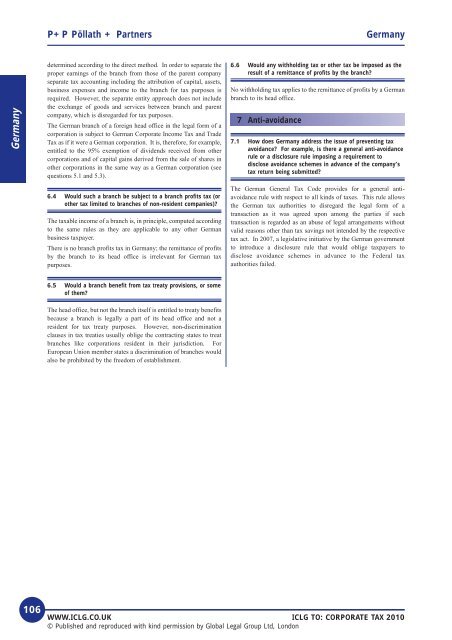Corporate Tax 2010 - BMR Advisors
Corporate Tax 2010 - BMR Advisors
Corporate Tax 2010 - BMR Advisors
Create successful ePaper yourself
Turn your PDF publications into a flip-book with our unique Google optimized e-Paper software.
P+P Pöllath + Partners<br />
Germany<br />
Germany<br />
determined according to the direct method. In order to separate the<br />
proper earnings of the branch from those of the parent company<br />
separate tax accounting including the attribution of capital, assets,<br />
business expenses and income to the branch for tax purposes is<br />
required. However, the separate entity approach does not include<br />
the exchange of goods and services between branch and parent<br />
company, which is disregarded for tax purposes.<br />
The German branch of a foreign head office in the legal form of a<br />
corporation is subject to German <strong>Corporate</strong> Income <strong>Tax</strong> and Trade<br />
<strong>Tax</strong> as if it were a German corporation. It is, therefore, for example,<br />
entitled to the 95% exemption of dividends received from other<br />
corporations and of capital gains derived from the sale of shares in<br />
other corporations in the same way as a German corporation (see<br />
questions 5.1 and 5.3).<br />
6.6 Would any withholding tax or other tax be imposed as the<br />
result of a remittance of profits by the branch<br />
No withholding tax applies to the remittance of profits by a German<br />
branch to its head office.<br />
7 Anti-avoidance<br />
7.1 How does Germany address the issue of preventing tax<br />
avoidance For example, is there a general anti-avoidance<br />
rule or a disclosure rule imposing a requirement to<br />
disclose avoidance schemes in advance of the company’s<br />
tax return being submitted<br />
6.4 Would such a branch be subject to a branch profits tax (or<br />
other tax limited to branches of non-resident companies)<br />
The taxable income of a branch is, in principle, computed according<br />
to the same rules as they are applicable to any other German<br />
business taxpayer.<br />
There is no branch profits tax in Germany; the remittance of profits<br />
by the branch to its head office is irrelevant for German tax<br />
purposes.<br />
The German General <strong>Tax</strong> Code provides for a general antiavoidance<br />
rule with respect to all kinds of taxes. This rule allows<br />
the German tax authorities to disregard the legal form of a<br />
transaction as it was agreed upon among the parties if such<br />
transaction is regarded as an abuse of legal arrangements without<br />
valid reasons other than tax savings not intended by the respective<br />
tax act. In 2007, a legislative initiative by the German government<br />
to introduce a disclosure rule that would oblige taxpayers to<br />
disclose avoidance schemes in advance to the Federal tax<br />
authorities failed.<br />
6.5 Would a branch benefit from tax treaty provisions, or some<br />
of them<br />
The head office, but not the branch itself is entitled to treaty benefits<br />
because a branch is legally a part of its head office and not a<br />
resident for tax treaty purposes. However, non-discrimination<br />
clauses in tax treaties usually oblige the contracting states to treat<br />
branches like corporations resident in their jurisdiction. For<br />
European Union member states a discrimination of branches would<br />
also be prohibited by the freedom of establishment.<br />
106<br />
WWW.ICLG.CO.UK<br />
ICLG TO: CORPORATE TAX <strong>2010</strong><br />
© Published and reproduced with kind permission by Global Legal Group Ltd, London
















